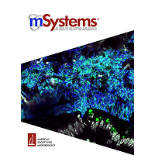
mSystems
Scope & Guideline
Bridging Disciplines Through Microbial Research Excellence
Introduction
Aims and Scopes
- Microbial Ecology and Interactions:
Research focusing on the interactions between microbes and their environments, including symbiotic and pathogenic relationships. - Genomic and Metagenomic Analysis:
Studies employing genomic and metagenomic approaches to understand microbial diversity, evolution, and functional capabilities. - Microbiome Studies:
Exploration of microbiomes in various contexts, including human health, agriculture, and environmental ecosystems, emphasizing their roles in disease and health. - Metabolomics and Metaproteomics:
Research on the metabolites produced by microbial communities and their functional implications in health and disease. - Antimicrobial Resistance:
Investigations into the mechanisms and spread of antimicrobial resistance among microbial populations, particularly in clinical settings. - Synthetic Biology and Bioengineering:
The application of synthetic biology to engineer microbial systems for biotechnological applications, including bioremediation and bioproduction.
Trending and Emerging
- Multi-Omics Approaches:
The integration of genomics, transcriptomics, proteomics, and metabolomics is increasingly prevalent, allowing for comprehensive insights into microbial functions and interactions. - Microbiome and Health Interconnections:
Growing interest in the relationships between microbiomes and health outcomes, particularly in understanding the gut-brain axis, metabolic diseases, and immune responses. - Environmental Microbiology and Climate Change:
Research focusing on microbial roles in biogeochemical cycles, including responses to climate change and their contributions to ecosystem health. - Microbial Therapeutics and Probiotics:
An increasing emphasis on the development of microbial-based therapies, including probiotics and phage therapies, to combat infections and modulate health. - Antimicrobial Resistance Mechanisms:
Continued exploration of the genetic and ecological mechanisms underlying antimicrobial resistance, especially in the context of clinical microbiology.
Declining or Waning
- Traditional Culture-Based Microbiology:
There is a noticeable decline in studies focusing solely on traditional culture-based methods for isolating microbes, as metagenomic approaches gain prominence. - Single-Organism Studies:
Research increasingly emphasizes community-level interactions rather than studies focusing on single microbial species, reflecting a shift towards understanding complex ecosystems. - Basic Descriptive Studies of Microbes:
The trend shows a decline in purely descriptive microbiological studies without functional or applied implications, as the field moves towards more integrative and applied research.
Similar Journals

TRENDS IN MICROBIOLOGY
Driving Progress in Medical Microbiology and VirologyTRENDS IN MICROBIOLOGY is a premier academic journal published by CELL PRESS, renowned for its high-impact research contributions in the fields of microbiology, infectious diseases, medical microbiology, and virology. With an impressive impact factor and a notable Scopus ranking—placing it in the top tiers of its categories, including a remarkable Q1 status in multiple disciplines—this journal is essential for researchers, professionals, and students aiming to stay at the forefront of innovative microbial research and ongoing advancements in pathogen biology. Since its inception in 1993, TRENDS IN MICROBIOLOGY has provided a platform for thought-provoking reviews and critical insights, fostering discussions that shape the future of the microbiological sciences. Based in the United Kingdom, TRENDS IN MICROBIOLOGY continues to lead the way in disseminating vital knowledge within the global scientific community.
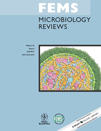
FEMS MICROBIOLOGY REVIEWS
Illuminating the Impact of Microbial LifeFEMS Microbiology Reviews, published by Oxford University Press, is a leading journal in the field of microbiology, with a notable impact in related disciplines such as infectious diseases and medicine. Since its inception in 1989, this esteemed journal has grown to occupy a prestigious position, consistently ranking in the first quartile (Q1) in various categories, including Infectious Diseases, Medicine (miscellaneous), and Microbiology. With an impressive Scopus ranking of #13 in Microbiology and #25 in Infectious Diseases, it is recognized for its high-quality and impactful reviews that bridge the gap between fundamental microbiological research and practical applications. Aimed at researchers, professionals, and students alike, FEMS Microbiology Reviews offers critical insights and comprehensive analyses, making it an essential resource for those engaged in the dynamic study of microbial life and its implications for health and disease.

INTERNATIONAL MICROBIOLOGY
Connecting Global Minds in Microbial DiscoveryINTERNATIONAL MICROBIOLOGY, published by SPRINGER, is a prominent peer-reviewed journal showcasing research across the diverse field of microbiology. Since its inception in 1998, the journal has provided a vital platform for the dissemination of innovative microbiological findings, with a focus on both fundamental and applied aspects of the discipline. Boasting an impressive Category Quartile ranking of Q2 in Medical Microbiology and Q3 in General Microbiology as of 2023, INTERNATIONAL MICROBIOLOGY stands out in the metrics of academic influence, ranking 60th out of 140 in the medical context and 90th out of 182 within the broader field of immunology and microbiology. This journal not only caters to senior researchers and academics but also engages budding scientists and professionals eager to stay abreast of the latest developments in microbiological research. Published without open access, it diligently curates quality content that contributes to the ongoing discourse in microbiology, ensuring that all articles uphold the highest academic standards. As the field continues to evolve, INTERNATIONAL MICROBIOLOGY remains committed to fostering scholarly communication and advancing microbiological knowledge on a global scale.

mLife
Empowering scholars to tackle real-world microbial challenges.Welcome to mLife, an emerging journal at the forefront of microbiological research published by the esteemed WILEY in China. With its ISSN 2097-1699 and E-ISSN 2770-100X, mLife serves as a vital platform for scholars and practitioners aiming to advance their understanding of microbial sciences. With an impressive Q2 ranking in the Microbiology category and a Scopus rank of 143 out of 182, mLife is quickly establishing itself as a valuable source of cutting-edge research. The journal, covering a range of innovative topics from immunology to environmental microbiology, provides an engaging venue for disseminating high-quality research findings aimed at addressing real-world challenges. Authors and readers alike benefit from its accessibility features that encourage scholarly collaboration and information sharing. As we converge on the rich microbial landscapes from 2022 to 2024, mLife is committed to fostering a community dedicated to rigorous research and impactful discoveries.
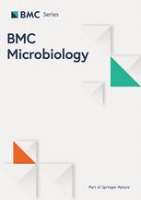
BMC MICROBIOLOGY
Innovating the future of microbiology, one study at a time.BMC Microbiology is a leading open access journal published by BMC, dedicated to advancing the field of microbiology since its inception in 2001. With an ISSN of 1471-2180, this journal provides a vital platform for researchers, professionals, and students to share and access high-quality research and innovation in both general and medical microbiology. Based in the United Kingdom, BMC Microbiology holds a commendable Q2 ranking in both various microbiological categories according to the 2023 Scopus rankings, indicating its strong influence in the microbiological community, with a rank of #47 out of 140 in Medical Microbiology and #62 out of 182 in general Microbiology. The journal's commitment to open access ensures that groundbreaking research is freely available to facilitate collaboration and knowledge sharing among the global community of microbiologists. With a focus on publishing original research, reviews, and case studies, BMC Microbiology plays a critical role in disseminating information that can impact health and environmental conditions around the world.

Microbiome
Empowering Research to Shape Microbial FuturesMicrobiome, published by BMC, is a leading open access journal established in 2013 that focuses on the intricacies of microbiological research. With an impressive impact factor and consistently ranking in the Q1 category in both Microbiology and Medical Microbiology, this journal serves as a pivotal platform for researchers, professionals, and students who are eager to explore the dynamic role of microbiomes in health and disease. With an ISSN and E-ISSN of 2049-2618, accessible from the United Kingdom, this journal encourages the dissemination of pioneering findings and facilitates collaboration. Its Scopus rankings place it among the top tier in its discipline, reflecting its commitment to advancing knowledge in microbiomics and its applications in medicine. As a vital resource for advancing scientific inquiry, Microbiome provides a forum for innovative research that drives the field forward, fostering understanding and solutions that impact diverse areas from ecology to therapeutics.
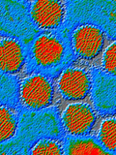
Annual Review of Microbiology
Pioneering Reviews for the Future of MicrobiologyAnnual Review of Microbiology is a preeminent academic journal published by Annual Reviews, specializing in the dynamic field of microbiology. With a rich history dating back to 1948, this journal has become a vital resource for researchers, professionals, and students alike, providing comprehensive reviews that synthesize the latest advancements and trends in microbiological research. The journal is renowned for its impressive reputation, holding a Q1 ranking in both Medicine (miscellaneous) and Microbiology, and achieving an outstanding Scopus rank of #12 out of 182 in the field, placing it in the 93rd percentile. Although it does not offer open access, the Annual Review of Microbiology remains integral to advancing knowledge and understanding of microbial science, helping to bridge the gap between fundamental research and practical applications in health, industry, and environmental sustainability. Its meticulously curated content serves as a crucial platform for fostering innovation and collaboration among the global research community.

Microbial Genomics
Shaping the Future of Microbial ResearchMicrobial Genomics, an esteemed journal published by the Microbiology Society, is a leading platform dedicated to the rapidly evolving field of microbial genomics. Since its transition to Open Access in 2016, this journal has consistently aimed to promote unprecedented transparency and accessibility in scientific research. Based in the United Kingdom, Microbial Genomics serves a diverse international audience, providing an invaluable resource for researchers, professionals, and students interested in genomics, microbiology, and related fields. With impressive quartile rankings in 2023, including Q1 status in Epidemiology, Genetics, and Microbiology, alongside strong performance in other categories, the journal is positioned at the forefront of academic discourse and innovation. This journal's commitment to excellence is not only reflected in its rigorous peer-review process but also in its dedication to showcasing groundbreaking research that informs current practices and shapes future trends in microbial science. As researchers explore the intricacies of microbial genomes, Microbial Genomics remains an essential resource fostering knowledge and collaboration in the scientific community.
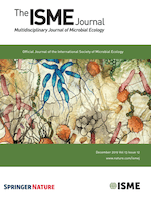
ISME Journal
Advancing knowledge at the intersection of life sciences.The ISME Journal, published by Oxford University Press, stands as a premier multidisciplinary platform dedicated to advancing the fields of Ecology, Evolution, Behavior, and Systematics as well as Microbiology. With its ISSN of 1751-7362 and E-ISSN 1751-7370, this renowned journal has successfully maintained a prestigious reputation reflected in its commendable Q1 rankings across both fields in 2023. It ranks #7 out of 721 in Ecology, Evolution, Behavior, and Systematics and #8 out of 182 in Microbiology, placing it in the top percentiles of relevant Scopus categories. Covering original research, reviews, and methodologies, the journal aims to foster interdisciplinary collaboration and inspire new paradigms in microbiome research, environmental processes, and evolutionary dynamics. Researchers, professionals, and students are encouraged to submit their findings to a journal that not only reaches a global audience but also influences the direction of ongoing scientific discourse. With a commitment to excellence, the ISME Journal represents an essential resource for anyone engaged in these transformative fields of study.
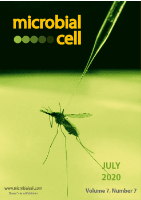
Microbial Cell
Fostering collaboration in microbial research.Microbial Cell is a distinguished open-access journal published by SHARED SCIENCE PUBLISHERS OG, focusing on the dynamic fields of microbiology, biochemistry, and molecular biology. Since its establishment in 2014, Microbial Cell has been at the forefront of disseminating cutting-edge research essential for advancing our understanding of microbial functions and interactions. With a commendable impact factor and ranking in the top quartiles (Q1 and Q2) across several categories, including Applied Microbiology and Biotechnology and Parasitology, this journal serves as an invaluable resource for researchers, professionals, and students alike. It features a comprehensive scope that encompasses the latest findings in genetics, cell biology, and virology, facilitating the academic community's access to high-quality peer-reviewed work. Microbial Cell not only contributes to advancing microbial sciences but also fosters an inclusive platform for knowledge sharing and collaboration in the scientific community.